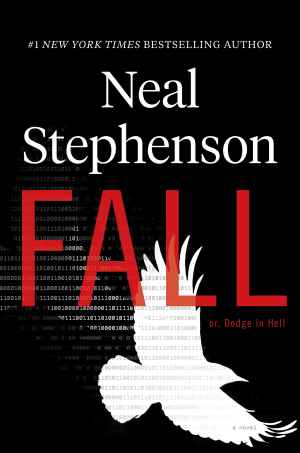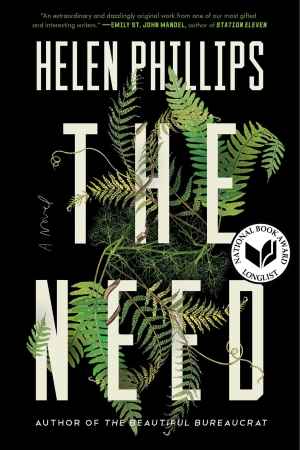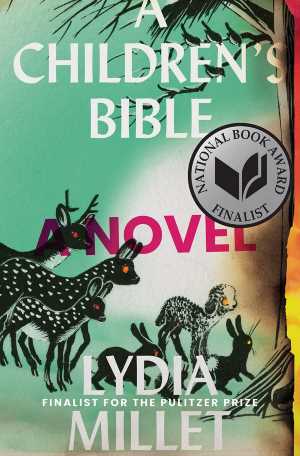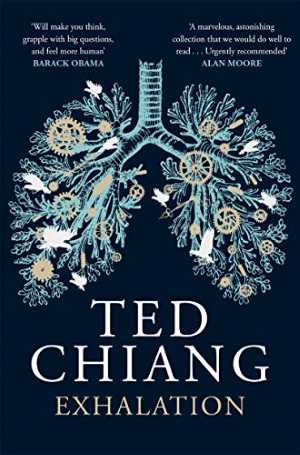By Jon Blandford, Ph.D.
Although I am undoubtedly a nerd, I’m honestly not much of a sci-fi nerd. I’m not sure I could tell the difference between a Baby Yoda and a grown-up one, and I’ve likely seen more late-night TV commercials featuring William Shatner
selling CPAP equipment than I have episodes of Star Trek. That said, in the past few years I have read a lot of what might be characterized as “sci-fi-adjacent” literary fiction—novels and stories that are less about people
and/or aliens shooting lasers at each other in outer space and more about the imaginative spaces where big ideas from science and big ideas about what make us human collide.
Here are some recent novels (and one short-story collection) that offer intriguing visions of our present and our possible futures.
 Fall, Neal Stephenson (2019)
Fall, Neal Stephenson (2019)
This 883-page opus tells the story of a video game magnate whose brain gets uploaded to the cloud after his death. What follows is a fascinating examination of consciousness and creativity that, once the uploaded consciousness imagines a new world into
existence, reads like a feverishly inventive combination of Paradise Lost and Lord of the Rings. The last couple hundred pages or so were—for me, at least—kind of a slog, but other parts of this book are absolutely riveting
and raise all sorts of interesting questions about the increasingly porous boundaries between the virtual and the real. I learned about qualia (a concept from philosophy that describes our individual subjective experiences), about prostheses and enough
about how blockchain and server farms work that I can now almost pretend to know what the heck people are talking about when they start going on about crypto. In an earlier novel, Stephenson coined the term “metaverse,” which Mark Zuckerberg
is now looking to monetize, but I can assure you that Stephenson’s actual work is far more interesting than tedious think-pieces about Web 3.0.
Klara and the Sun, Kazuo Ishiguro (2021)
Lots of sci-fi writers—including Isaac Asimov and Philp K. Dick—have written about the blurry line between artificial and human intelligence, but I would be surprised if that theme has ever been treated with greater warmth than it is in Klara
and the Sun. Ishiguro’s illuminating novel is narrated by the artificial friend (an “AF,” in the book’s lexicon) of a girl battling illness. I read it in a few nights, thought about it, re-read parts of it, and still can’t
decide if it is a book about how the qualities that make us most human can’t be duplicated or a book about our capacity to create simulations of ourselves that might one day love and hope as we do. Either way, it is quite beautiful.
 The Need, Helen Phillips (2019)
The Need, Helen Phillips (2019)
This novel starts off like a home-invasion thriller and then goes to some very strange places. The protagonist is a paleobotanist who discovers weird artifacts at a dig site, including a Coca-Cola bottle from the 1970s with the logo slanted in the wrong
direction, a green plastic toy soldier from the 1960s with a monkey’s tail, and a Bible from the early 20th century that refers to God using “she.” Then things get weirder—a lot weirder, in fact, in ways that if I were to share
would spoil a big twist. The paleobotanist is also a young mother, and that’s where this book really has something to say. As the parent of a young child myself, I am not sure I have read anything that better captures the visceral combination
of terror, love, self-doubt, exhaustion and joy that comes along with suddenly being responsible for a tiny human who means everything to you.
Bewilderment, Richard Powers (2021)
In another sci-fi-adjacent literary novel that is really about parenting, a widowed astrobiologist struggles to connect with a neurodivergent son who is troubled both by the death of his mother and by a Greta Thunberg-esque preoccupation with looming
environmental catastrophe. To be honest, I found the climate politics of this book a bit shrill. Can’t we inspire our children to be optimistic about the future while still acknowledging the impact we have had on our planet and our
responsibility to do better? Again, as a parent, I sure hope so. What did really work for me is Bewilderment’s exploration of the distances between us and other life—whether that life is the theoretical kind in faraway galaxies that
astrobiologists study or the inner life of our closest loved ones here on Earth. To be human, Powers suggests, is to want to bridge those distances, and while science may offer us tools for doing so, it’s unclear if science can get us all
the way there without imagination and love.
 A Children’s Bible, Lydia Millet (2020)
A Children’s Bible, Lydia Millet (2020)
Like Bewilderment, A Children’s Bible falls into the category of novels about climate change that some critics are calling “cli-fi.” While that term is a little too cute for me, this novel about what we owe to future generations is anything
but. Indeed, where Bewilderment occasionally ventures into tear-jerker territory, A Children’s Bible is darker in tone and often rather funny. It starts off with a group of well-heeled, hyper-educated coastal elites vacationing together
in a rented home, where they spend most of their time fooling around and drinking while their unsupervised children look on in embarrassment and contempt. The children leave, the weather gets biblically bad, and the novel transforms from a sardonic
send-up of the generation currently in charge to an allegory about how our children and our children’s children might make meaning of the world we have left them.
Borne, Jeff VanderMeer (2017)
This is such a weird and wonderful book. The protagonist is a young woman who survives by scavenging for resources in a post-apocalyptic world inhabited by various biotech experiments gone- wrong and lorded over by one particularly terrifying Godzilla-sized
flying bear. The “Borne” referred to in the title is scavenged biotech refuse that initially seems like a sentient houseplant before it evolves into something that is simultaneously much more human and inscrutably alien. Looking at what
I just wrote, I realize that seems completely bonkers, but I promise you it is bonkers in the most readable way. Of all the novels and stories on this list, this is the one I would be least surprised to see adapted into a blockbuster film. In a parallel
universe where every other Hollywood production isn’t a Marvel superhero movie, that probably would have already happened.
Parable of the Sower (1993) and Parable of the Talents (1998), Octavia Butler
These two are older than anything else on the list, but they were new to me. Set in the 2020s (hey, that’s now) the Parable books depict an American society that has collapsed. The novels’ protagonist, Lauren Oya Olamina, suffers from a condition
where she acutely feels others’ pain, and, with so much pain to be felt in the world, she forms a new religion she calls Earthseed that foretells leaving behind a broken Earth and resettling on other planets. Widely recognized as one of the
most important sci-fi writers of the 20th century, Butler is notable for interweaving genre conventions with serious considerations of social and political issues, especially around gender and race. Science-fiction is often derided as being escapist
entertainment, but there is no escaping the extent to which Butler, who died in 2006, anticipated the fractures and fault lines of our present moment.
 Exhalation, Ted Chiang (2019)
Exhalation, Ted Chiang (2019) I’ve saved the best for last. This collection of short stories is one of the best things I have read in the last few years, and I read a lot. Chiang’s stories cover familiar enough themes—time travel, free will, alien worlds, memory
and subjectivity, artificial intelligence—but approach them from new angles that yield surprising, often dazzling insights. With a few exceptions—e.g., the Butler novels noted above—I find dystopian sci-fi novels rather wearying,
even more so during the last two years when the seemingly never-ending pandemic has made it feel like we are living in one. Chiang’s stories are the antidote to that. To read them is to be alive to the power of both the scientific and creative
imaginations. If you read just one book on this list, read this one.
Dr. Jon Blandford, an associate professor of English, is director of Bellarmine’s Honors Program, president of the Kentucky Honors Roundtable and secretary of the Southern Regional Honors Council.